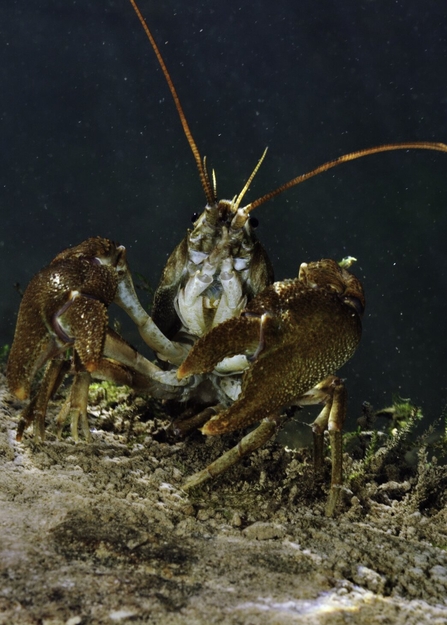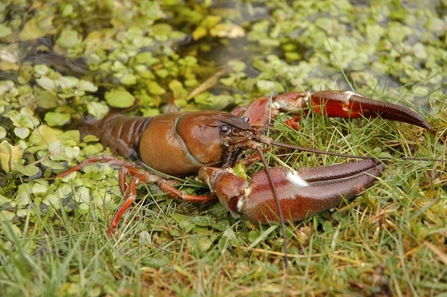In our blog Save Our Rivers we discussed the impacts of invasive non-native species (INNS) in the River Dee Catchment and introduced Check Clean Dry. This is a simple but effect biosecurity practice to prevent the spread of INNS. But hang on....what is biosecurity??
Invasive Species Week 24th-30th May 2021
© NWWT

White-clawed crayfish (Austropotamobius pallipes), native to the UK, on river bed, viewed underwater. Eden Rivers Trust crayfish survey - capture and release - conservation work. England: Cumbria, Eden Valley, Great Strickland, River Leith, September - Linda Pitkin/2020VISION
One thing that has become apparent through the pandemic is how easily viruses can be transmitted from person to person. We have all be doing biosecurity such as social distancing, washing our hands, and wearing face masks so that we can keep each other safe. Nature needs your help to protect it in much the same way.
Ok, so imagine you are a native White-clawed crayfish happily wandering around your river bed home.

Invasive non-native species American signal crayfish ©Trevor Renals
Suddenly a pair of wellies plunge into the river, and worst of all they are contaminated! The person wading in the river didn’t clean their wellies since the last time they used them in a pond with the invasive non-native species American signal crayfish, which happen to also be carriers of crayfish plague. Suddenly your home has become an infection zone, with 0% chance of you and your family surviving!!
This may seem just the stuff of nightmares, but crayfish plague spread by non-native crayfish can wipe out whole native crayfish populations within a matter of weeks. On top of being carriers of the crayfish plague, signal crayfish are a lot bigger and therefore outcompete white-clawed crayfish for food and habitat, as well drastically changing the way a river functions by burrowing into the river bank.
Biosecurity works at the prevention stage, which is by far the most effective way to control invasive non-native species in the first place, avoiding damage and mortality rates within our natural environments.
Biosecurity Boot Cleaning Stations
To help us all carry out effective biosecurity practices with ease, as part of the ‘Our River Wellbeing’ project we have installed biosecurity boot cleaning stations at Park in the Past in Hope, Alyn Waters Country Park, Tŷ Mawr Country Park, and on the Offa’s Dyke Path by the Boat Inn in Erbistock.
Run your footwear over the brushes back and forth until all the mud and debris has been removed (please be nice and don’t use it to remove dog muck, it’s nasty stuff!!). If you have access to clean water (from a tap or a bottle) be sure to rinse off anything missed. Then leave your footwear and any other kit that has come into contact with the water somewhere they can dry out completely before using again.
Further information on Invasive Species Week can be found here.




